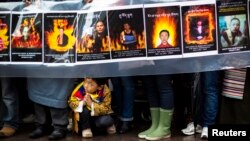China has convicted two Tibetans of "intentional homicide" for inciting self-immolations in protest of Chinese rule.
The official Xinhua news agency says 40-year-old Lorang Konchok was condemned to death with a two-year reprieve, a sentence that usually amounts to life in prison. The court in southwestern Aba prefecture also sentenced his nephew, 31-year-old Lorang Tsering, to 10 years in prison.
Xinhua says the two men "incited and coerced" eight people to self-immolate. It says three of the eight set themselves on fire and died in 2012, while the others "willfully abandoned their plans" or were stopped by police.
Nearly 100 Tibetans have set themselves on fire since 2009 to protest what they see as oppressive Chinese rule of ethnic Tibetan areas of China.
The government has condemned the suicides as acts of terrorism, saying they are encouraged by exiled activists who are working for Tibet's independence.
Chinese Foreign Ministry spokesperson Hong Lei said Thursday's trial shows the Dalai Lama is behind the self-immolations, a charge the exiled spiritual leader has denied.
"We hope the international community can clearly see, via this judgment, the sinister, malicious methods used by the Dalai clique behind these acts and denounce their crimes."
Beijing has been under increasing pressure to stop the suicide protests, which increased rapidly during the last half of 2012.
Late last year, the government announced new rules under which those encouraging the protests could be sentenced to "intentional homicide." Thursday's sentencing appears to be the first time that rule has been used.
Many Tibetans in China accuse the government of a campaign of religious and cultural persecution, as the country's majority Han ethnic group continues to move into historically Tibetan areas.
China rejects that, saying Tibetans enjoy religious freedom. Beijing also points to huge ongoing investment it says has brought modernization and an increased standard of living to Tibet.
The official Xinhua news agency says 40-year-old Lorang Konchok was condemned to death with a two-year reprieve, a sentence that usually amounts to life in prison. The court in southwestern Aba prefecture also sentenced his nephew, 31-year-old Lorang Tsering, to 10 years in prison.
Xinhua says the two men "incited and coerced" eight people to self-immolate. It says three of the eight set themselves on fire and died in 2012, while the others "willfully abandoned their plans" or were stopped by police.
Nearly 100 Tibetans have set themselves on fire since 2009 to protest what they see as oppressive Chinese rule of ethnic Tibetan areas of China.
The government has condemned the suicides as acts of terrorism, saying they are encouraged by exiled activists who are working for Tibet's independence.
Chinese Foreign Ministry spokesperson Hong Lei said Thursday's trial shows the Dalai Lama is behind the self-immolations, a charge the exiled spiritual leader has denied.
"We hope the international community can clearly see, via this judgment, the sinister, malicious methods used by the Dalai clique behind these acts and denounce their crimes."
Beijing has been under increasing pressure to stop the suicide protests, which increased rapidly during the last half of 2012.
Late last year, the government announced new rules under which those encouraging the protests could be sentenced to "intentional homicide." Thursday's sentencing appears to be the first time that rule has been used.
Many Tibetans in China accuse the government of a campaign of religious and cultural persecution, as the country's majority Han ethnic group continues to move into historically Tibetan areas.
China rejects that, saying Tibetans enjoy religious freedom. Beijing also points to huge ongoing investment it says has brought modernization and an increased standard of living to Tibet.






